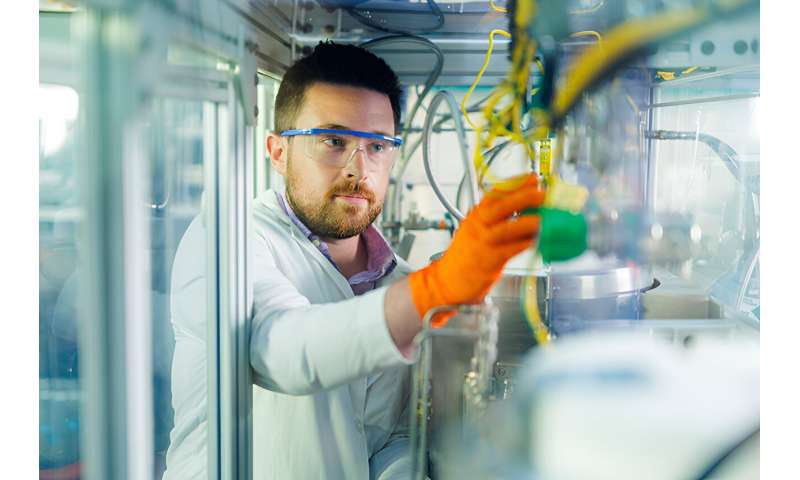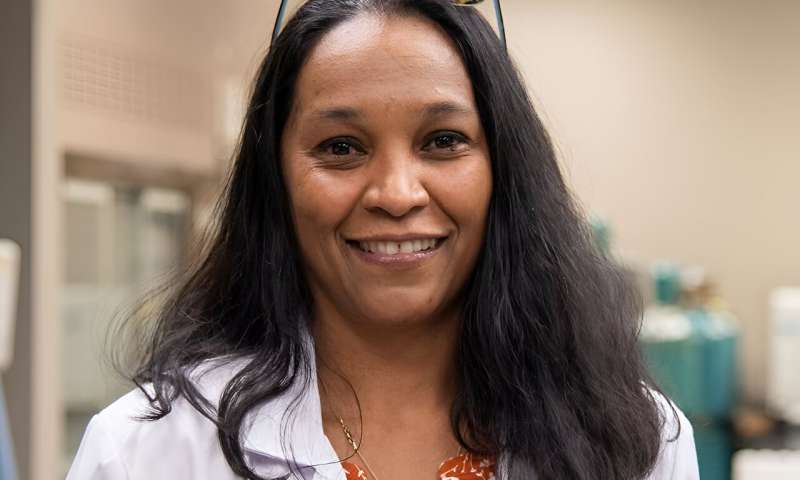Shaping the Circular Bioeconomy in Tennessee

Less than 8 percent of all extracted petroleum, metals, and other resources used worldwide are reused or recycled.
"Unfortunately, this data point demonstrates our linear way of thinking about earth's finite resources," said Nicole Labbé, professor in the University of Tennessee, Knoxville's School of Natural Resources and assistant director of the Center for Renewable Carbon. "To secure the future of our planet, we need to radically change our approach."
Researchers from UT and Oak Ridge National Laboratory are developing innovations shaped by a different way of thinking: prioritizing circularity. Circular bioeconomy systems research focuses on two broad strategies: expanding the use of biomass (that is, bio-derived carbon from plants) and preventing or reducing waste.
"We aim to use carbon-capturing plants as our primary feedstock instead of petroleum," Labbé said. "We are also developing innovative approaches to cultivate and harvest biomass more efficiently and to minimize waste generated in the conversion of biomass into materials and products. In addition, we are committed to ensuring that these materials and products are used for as long as possible. We plan for their end-of-life recycling, too, to reduce the impact on landfill. Ultimately we want to keep the carbon going in the economic cycle or sequester it.
"Many researchers at UT and ORNL have expertise critical to the growth of our circular bioeconomy. We've each been pursuing our individual research goals for a long time," Labbé added. "Now we have an amazing opportunity to come together to address challenges that none of us could solve alone—thanks to this UT–Oak Ridge Innovation Institute initiative."
Earlier this spring, UT-ORII committed funding for the team to recruit, hire, and mentor 10 researchers at each institution.
"UT-ORII funding enables us to bring in new expertise and perspectives," Labbé said. "We'll build on our strengths and plan to advance the frontiers of our science using artificial intelligence and machine learning."
The initiative covers three interconnected themes: 1) improving resource efficiency and decreasing carbon emissions associated with growing, harvesting, and processing biomass; 2) developing cost-effective bio-derived products designed to be repaired, reused, recycled, composted, and finally combusted for energy; and 3) designing metrics to quantify the social, environmental, and economic value of circular bioeconomy systems, to inform system improvements, and to empower future supply chain and policy decisions.

"We'll connect the dots across individual systems that make up the circular bioeconomy system and build critical feedback loops between domain experts that don't normally communicate," said Erin Webb, who leads ORNL's Bioresource Science and Engineering Group and serves as a joint professor in UT's Department of Biosystems Engineering and Soil Science. "We'll be able to generate enough data to use AI to advance our modeling tools, especially to better account for the high level of variability that is common when working with plants. We want to develop models for tracking carbon through the entire circular bioeconomy to help determine the most beneficial strategies for decarbonization."
"Creating more sustainable agriculture and manufacturing systems is a global issue where local solutions hold great promise," Labbé said. "We will leverage all of Tennessee's great resources, including our talented workforce and our incredible innovation capacity."
"East Tennessee has great potential to lead in the circular bioeconomy," said Gerald Tuskan, ORNL corporate fellow and director of the US Department of Energy's Center for Bioenergy Innovation.
Tennessee farms and managed forests can supply biomass, and Tennessee growers stand to benefit from new markets for crops and from the increasingly efficient and profitable agriculture practices advanced by this research.
Tennessee is also home to more than 900 companies in the automotive manufacturing sector. The UT–ORNL team will work specifically with the automotive industry to create a testbed for bio-derived materials and products ranging from structural components to upholstery.
"Industry is ready for this," said Alexei Sokolov, UT–ORNL Governor's Chair for Polymer Science. "We will leverage existing ORNL and UT relationships with automotive partners as well as the relationships UT Extension cultivates with farmers across the state. Once we start to demonstrate success stories in the automotive sector, we will add new partners and industries to explore other applications, such as in packaging."
"The students we engage in circular bioeconomy systems research and education have the opportunity to enter this field at its birth," Tuskan said. "They will learn about industries' needs firsthand and can influence how their careers develop."
The education component of the initiative doesn't stop with students. "At the same time we are training students," Labbé said, "we also want to demonstrate to faculty and leaders across UT and ORNL how their fields—whether agriculture, chemistry, sociology, or many others—can play a role in advancing the circular bioeconomy. When they see their work in this context, we believe they can help their students understand how they are connected and can be a part of the solution.
"I'm grateful UT–ORII understands the importance of what we're trying to do," Labbé added. "Ultimately, we want to create a more sustainable world for everyone. It will take all of us working together to achieve that."
Provided by University of Tennessee at Knoxville